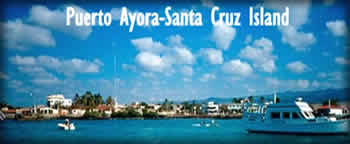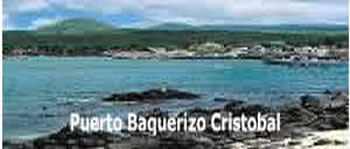
Galapagos Flights and prices | Galapagos Hotels | diving tips | About us | FAQ | Booking and Payments | News
General Information | Yachts Information | History | Geology | Flora & Fauna | Ecuador
Oceanography | Islands | Diving | Reservations | home | sitemap
Newsletter
Join the National Geographic channel on a tour of these unique islands in a stunning three hour high definition event, please visit:http://channel.nationalgeographic.com/channel/galapagos/
The Charles Darwin Research Station conducts and facilitates research in the Galapagos Islands and the Galapagos Marine Resources Reserve of Ecuador. The Darwin Station is part of the Charles Darwin Foundation for the Galapagos Islands, an international non-profit organization dedicated to scientific research in the Galapagos Islands since 1959. The Darwin Station provides:
Information and technical support for the Galapagos National Park Service and other branches of the government of Ecuador
Support for the resident and visiting scientists who work in Galapagos. Environmental education for island communities and schools and for the visitors that come to Galapagos each year.
The Galapagos National Park Service is the government institution charged with the management of the Galapagos National Park and Marine Reserve. Staffed with biologists and natural resource managers, the Park Service is responsible for the protection of the Park’s biodiversity and the delicate interaction between residents, visitors, and Galapagos flora and fauna. In recent years, the GNPS has been marked by frequent changes of the Park Director, a position which has become subject to political exploitation. In 2005, under pressure of the international conservation community, a new, transparent process was designed and approved for naming future Park Directors. It is hoped that this new process will bring much-needed stability to the GNPS.
------------------------------------
 |
 |
 |
Land-Based diving from Santa Cruz Island, packages from $2,280 These Packages are based on double accomodations includes;Quito-Ecuador arrival, transfers to first class hotel, overnight, transfers to Airport, Airfare Quito/Glpgs/Quito. ; Santa Cruz Tourist class Hotel breakfast and lunch box, optional dinner, 8days/7nights diving tour; 2 dives per day; return and transfer to first class Hotel in Quito overnight, transfer to Airport for flight to home city. |
Land-based diving from Cristobal Island, packages from $1,950 This diverse land-based diving Galapagos trip includes daily visits to the central and southern islands and overnights in hotels. This is a multisport activity in the Islands, with 1 or 2 dives daily, snorkeling, mountain biking, trekking and horseback riding. This unique tour combines the best of Galapagos nature, marine fauna, natural history and adventure weekly departures arriving Quito-Ecuador Mondays. |
Combined 4 days Amazon Jungle and 5 days land-based diving Galapagos- prices from $3,280 These Packages prices are based on double accomodations and includes;4 days Sacha Lodge Amazon resort and 5 days Galapagos diving Package.Quito-Ecuador arrival, transfers to first class Hotel, overnight, transfers to Airport, round trip airfare to Sacha Lodge resort, 4 days/3nights Amazon Jungle tour,return to Quito, transfer to Hotel for overnight Hotel, transfer to airport for flight to Galapagos,Quito/Glpgs/Quito airfare. Santa Cruz Island Tourist class Hotel breakfast and lunch box, optional dinner, 8days/7nights diving tour; 2 dives per day; return and transfer to first class Hotel in Quito overnight, transfer to Airport for flight to home city. |
El Niño phenomena
Scientists say that a new El Niño is building. They have been seeing a steep rise in water temperature in the eastern Pacific. It is likely to strengthen this year and into early 2007. Fortunately, it appears to be weaker than past El Niño's, which at times (1982-83 and 1987) have been quite destructive of wildlife.
During an El Niño, sea temperatures rise and rainfall increases. Animals that feed on marine life, like Blue Footed Boobies and Sea Lions, suffer because fish move away to cooler waters. Galapagos Penguins have been hit especially hard. On the other hand, vegetation flourishes and land birds thrive. Another problem, say researchers at the Charles Darwin Research Station, relates to insect populations. Mosquitoes will have more places to breed, thus increasing the risk of disease transmission.
Related to this is the long-term effect of global warming. The World Wildlife Fund just this month issued a report saying that global warming could cause widespread bird extinctions in some areas. "From migratory insect-eaters to tropical honeycreepers and cold water penguins, birds are highly sensitive to changing weather conditions and many are already being affected badly by global warming," the new study said.
Call us and we will work with diligence to assure your Galapagos trip of a lifetime! We work on your budget, even if you want an mainland Ecuador extension to the Amazon Jungle,Quito city tour, Otavalo Indian Market, Hiking to the Volcano Cotopaxi, or to a Middle of the World Tour. We will always be ready to help you, just call us or click here Reservations
Galapagos Flights and prices |Galapagos Hotels | diving tips | About us | FAQ | Booking and Payments | News
General Information | Yachts Information | History | Geology | Flora & Fauna | Ecuador
Oceanography | Islands | Diving | Reservations | home | sitemap
e-mail:info@galapagosdivers.com
Galapagos Divers Inc.
PO.BOX 312 Hallandale FL 33008
Miami local # 1-305-332-3099
Toll Free:1-800-4260802
Telefax: 954-967-2547
Branch Offices in Quito and Santa Cruz Island-Galapagos-Ecuador
International callers 001-305-332 3099